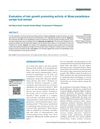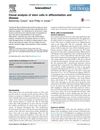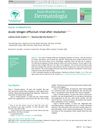 14 citations,
March 1995 in “Journal of cell science”
14 citations,
March 1995 in “Journal of cell science” SV40 T antigen in hair follicles causes abnormal hair and health issues in mice.
 13 citations,
January 2011 in “Journal of natural pharmaceuticals”
13 citations,
January 2011 in “Journal of natural pharmaceuticals” Unripe banana extract may promote hair growth similar to minoxidil.
 11 citations,
July 2016 in “Current Opinion in Cell Biology”
11 citations,
July 2016 in “Current Opinion in Cell Biology” New techniques have enhanced our understanding of how stem cells function and the role of mutations in aging tissues, which may influence future cancer therapies.
 9 citations,
April 2023 in “Frontiers in immunology”
9 citations,
April 2023 in “Frontiers in immunology” New technologies help us better understand how skin microbes affect skin diseases.
 8 citations,
May 1998 in “Journal of Oral and Maxillofacial Surgery”
8 citations,
May 1998 in “Journal of Oral and Maxillofacial Surgery” Acne is caused by increased sebum, abnormal skin shedding, bacteria, and inflammation, not dirt; treatments vary from creams to antibiotics or isotretinoin, with severe cases needing a dermatologist's care.
 8 citations,
January 1996 in “Springer eBooks”
8 citations,
January 1996 in “Springer eBooks” Male pattern baldness may be caused by factors like poor blood circulation, scalp tension, stress, and hormonal imbalances, but the exact causes are still unclear.
 8 citations,
November 1990 in “International Journal of Dermatology”
8 citations,
November 1990 in “International Journal of Dermatology” Albendazole may cause hair loss.
 5 citations,
February 2015 in “Journal of Comparative Pathology”
5 citations,
February 2015 in “Journal of Comparative Pathology” High proliferative activity and peripheral invasion indicate malignancy in canine sebaceous gland tumors; the term 'epithelioma' should be updated for clarity.
 5 citations,
December 2014 in “Medicine and Pharmacy Reports”
5 citations,
December 2014 in “Medicine and Pharmacy Reports” Ciproterone acetate improves hair regrowth and acne in most female patients.
 5 citations,
June 2004 in “The Journal of The British Menopause Society”
5 citations,
June 2004 in “The Journal of The British Menopause Society” Testosterone therapy can improve sexual satisfaction and mood in surgically menopausal women when used with estrogen, but its long-term safety and effects on naturally menopausal and premenopausal women are unclear.
 4 citations,
March 2022 in “Frontiers in pharmacology”
4 citations,
March 2022 in “Frontiers in pharmacology” Prunus mira Koehne is valuable for hair growth and has potential for sustainable use, but needs more research and conservation.
 4 citations,
January 2022 in “Open Health”
4 citations,
January 2022 in “Open Health” Eating healthy, exercising, and changing behaviors are the best first steps to treat Polycystic Ovary Syndrome (PCOS).

research Acne
4 citations,
January 2019 Acne is a common skin condition that can be influenced by diet, lifestyle, and hormones, and requires a treatment approach that includes psychological considerations.
 3 citations,
January 2024 in “Signal transduction and targeted therapy”
3 citations,
January 2024 in “Signal transduction and targeted therapy” Lymphatic vessels are essential for health and can be targeted to treat various diseases.
 3 citations,
April 2022 in “Farmacia”
3 citations,
April 2022 in “Farmacia” Certain foods and supplements can help treat skin diseases alongside medication.
 3 citations,
April 2010 in “Journal of Receptors and Signal Transduction”
3 citations,
April 2010 in “Journal of Receptors and Signal Transduction” Minoxidil, a common alopecia medication, might cause eye changes due to its properties and lack of tissue selectivity.
 3 citations,
January 2007 in “Elsevier eBooks”
3 citations,
January 2007 in “Elsevier eBooks” The document concludes that individualized treatment and lifestyle changes are important for managing menopause symptoms and health risks.
 3 citations,
June 1983 in “Archives of Dermatology”
3 citations,
June 1983 in “Archives of Dermatology” Aminopterin effectively improves skin conditions but has toxic side effects that need careful monitoring.
 2 citations,
May 2019 in “Advances in wound care”
2 citations,
May 2019 in “Advances in wound care” Blood-derived CD34+ cells speed up healing, reduce scarring, and regrow hair in skin wounds.
 2 citations,
January 2008 in “Elsevier eBooks”
2 citations,
January 2008 in “Elsevier eBooks” Humans have limited regenerative abilities, but new evidence shows the adult brain and heart can regenerate, and future treatments may improve this by mimicking stem cell environments.
 1 citations,
July 2021 in “Anais Brasileiros de Dermatologia”
1 citations,
July 2021 in “Anais Brasileiros de Dermatologia” The conclusion is that three signs can help diagnose hair loss after it happens, potentially avoiding more invasive tests.
 1 citations,
September 2012 in “Expert Review of Endocrinology & Metabolism”
1 citations,
September 2012 in “Expert Review of Endocrinology & Metabolism” Androgen replacement therapy can improve libido and mood in women with severe androgen deficiency, but more research is needed on its long-term safety.
 1 citations,
December 2010 in “Elsevier eBooks”
1 citations,
December 2010 in “Elsevier eBooks” Cell transplantation faces challenges in genitourinary reconstruction, but alternative tissue sources and microencapsulation show promise.
 1 citations,
August 2004 in “Alternative & complementary therapies”
1 citations,
August 2004 in “Alternative & complementary therapies” Non-drug methods like diet, supplements, and aromatherapy can help manage hair loss and its emotional impact.
 January 2025 in “Frontiers in Immunology”
January 2025 in “Frontiers in Immunology” IVIG therapy significantly improved symptoms in a patient with APS-2 and SPS.
 April 2024 in “Cell death and differentiation”
April 2024 in “Cell death and differentiation” Cell death shapes skin stem cell environments, affecting inflammation, repair, and cancer.
 January 2024 in “Theranostics”
January 2024 in “Theranostics” Exosomes from special stem cells help treat ulcerative colitis by reducing inflammation and stress.
 July 2023 in “International journal of pharmacognosy and life science”
July 2023 in “International journal of pharmacognosy and life science” The herbal hair oil made from various plants might be a good alternative to synthetic hair loss treatments.
 January 2021 in “Acta Scientiae Veterinariae”
January 2021 in “Acta Scientiae Veterinariae” Levothyroxine effectively treated a dog's skin and hair problems caused by hypothyroidism.

The document describes a rare case of IFAP syndrome, a genetic condition with symptoms of hair loss, light sensitivity, and scaly skin.






























